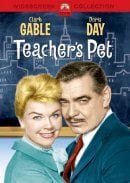
Note: Plot spoilers below.
The phrase “a Doris Day movie” typically evokes two kinds of expectations. It’s either a feminist scratching post or a campy comedy, with Day as the unmarried, virginal executive fending off sexual advances from a stereotypical member of the white boy elite. Teacher’s Pet, however, takes another focus, a contest between street smarts and formal education as means to success.
In the late 1950s, thanks to the GI bill, a college education could lead up the corporate ladder. Also unexpectedly, the film casts this tension against a New York City backdrop, and displays a gritty social conscience, much like the previous year’s 12 Angry Men, with which it also shares an affection for craggy white male faces, such as Clark Gable’s. He plays hardboiled Manhattan newspaper editor Frank Gannon, who never graduated high school and subsequently thinks college is a lot of baloney. When asked to give a guest lecture at a continuing adult education college, he responds with a venomous letter asserting that one can’t teach journalism; college, he writes, is just “amateurs teaching amateurs how to be amateurs.” But his boss twists his arm, so away he goes.
It turns out the teacher is the pert, slightly dyke-ish Erica (Day), conspicuously teaching mostly men, most older than she is. This is not portrayed as odd within the context of the film, though it sure does rile Gannon. He decides to pose as a student rather than reveal his identity as the would-be lecturer. As a middle-aged editor who doesn’t quite know how to grow old gracefully, Gable is the Clint Eastwood of the late ’50s, deconstructing the masculine myths he embodied in his younger days. Gannon is like any number of characters Gable played in the 1930s, the reporter in It Happened One Night (1934) grown older, alone, and confronting his own irrelevance at the dawn of the ’60s. Day, on the other hand, is just coming into her own here, as if she and the times are in perfect harmony. Her signature “awkward” line readings (stopping and correcting herself, or stepping on Gable’s lines, then saying, “Sorry, go ahead”) only underline her “naturalistic” performance style, quite the opposite of Gable’s mannered affect.
What’s most interesting looking at Day in Teacher’s Pet is how her masculine style of dress and butch haircut make her fit the role of the “empowered” woman, even as she is playfully “feminine.” Thus Gannon can respect Erica as a teacher, but also lust after her in a condescending manner. Setting an example of how the right man for Erica behaves is a professor Gannon assumes is his rival for her affections, psychologist Dr. Hugo Pine (Gig Young, in an Oscar-nominated performance). In a long scene at a joint called “The Bongo Club,” Gannon runs into Pine and Erica while drowning his sorrows with a blonde singer named Peggy DeFore (Mamie Van Doren). He engages Pine in a sort of good-natured pissing and drinking contest, the sort of thing the “old” Gable, the Gable who flew around in dangerous planes and socked guys on the jaw, would have no trouble winning. But here, Gannon loses his hold on Erica when it’s revealed he doesn’t know the mambo.
Eventually Gannon gets the girl, and he seems all set to bed her when he’s stopped by the realization that her late father was a small town journalist who once won the Pulitzer. Suddenly Gannon recognizes the deception of his own come-on. The next morning Gannon shows up at Pine’s doorstep looking for help. Pine exposes Gannon’s desire to seduce Erica as a means to “prove” his superiority, basically covering up his long-held deep anxiety about being uneducated. It takes reading through some of Erica’s father’s prizewinning old newspaper columns (which Gannon says “stink”) to realize his own value as a writer, despite this lack of formal education.
At the same time, Erica is forced to admit daddy’s shortcomings when she examines his work with an unbiased critical eye. This becomes more important to the film than any “will they or won’t they?” contrivances. If anything, the whole sexual farce aspect dissolves in the light of these loftier issues. Teacher’s Pet is an intelligent look at a time when the old guard of tough-talking gumshoes and snappy reporters were about to surrender to a new breed: educated and self-aware men and women.

![Call for Papers: All Things Reconsidered [MUSIC] May-August 2024](https://www.popmatters.com/wp-content/uploads/2024/04/all-things-reconsidered-call-music-may-2024-720x380.jpg)



